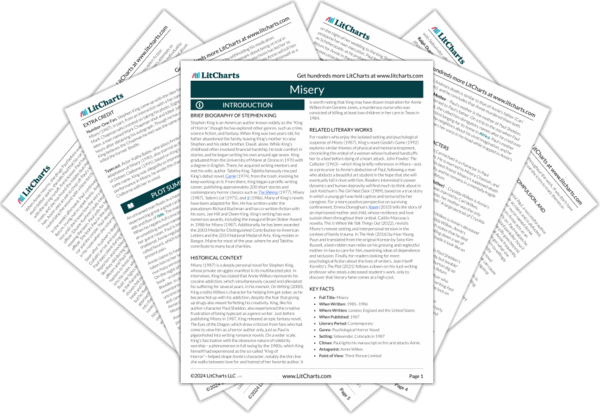Natural phenomena such as tides and weather symbolize entrapment by forces outside of one’s control. Paul initially associates the pain in his shattered legs with a childhood memory of jagged pilings which are routinely covered and exposed by tidal movement. The Novril pills (and Annie, as their provider) act as the moon which pulls the tide of relief over the pain of the pilings—but inevitably, the tide goes back out after a time, and Paul has no control over its return.
Similarly, Paul imagines Annie’s volatile shifts in mood as an immutable cycle, like seasons in the natural world. Like the weather, Annie’s psychosis expresses itself in emotional highs and lows. On the occasions where her mood darkens rapidly, Paul thinks of her as “Hurricane Annie,” emphasizing the violent and destructive behavior that inevitably results from such sudden anger. Paul’s survival is dependent upon Annie, so while her moods are often unpredictable, he frequently feels trapped by their sudden shifts.
Finally, the literal change of seasons that Paul witnesses through the guest room window plays a vital role in determining his fate. Paul realizes that the car he crashed will likely be discovered when the snow melts in spring, and when that happens, Annie will see no other choice but to kill him. In Paul’s mind, then, the approach of the spring thaw becomes synonymous with unavoidable death.
Natural Phenomena Quotes in Misery
The pain wasn’t tidal. That was the lesson of the dream which was really a memory. The pain only appeared to come and go. The pain was like the piling, sometimes covered and sometimes visible, but always there. When the pain wasn’t harrying him through the deep stone grayness of his cloud, he was dumbly grateful, but he was no longer fooled—it was still there, waiting to return.
He looked around quickly, chin down on his breastbone, eyes crafty and frightened. Although he knew it was too soon to be feeling any relief, he did feel it—having the pills, it seemed, was even more important than taking the pills. It was as if he had been given control of the moon and the tides—or had just reached up and taken it. It was a huge thought, awesome…and yet also frightening, with undertones of guilt and blasphemy.












